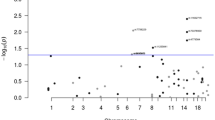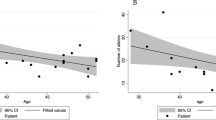Abstract
Colon cancer remains the third leading cause of death due to cancer in the US, where it affected more than 145,000 individuals in 2005. Up to 30% of these cases exhibit familial clustering, which means that tens of thousands of individuals have a disease with a potentially definable genetic component. Approximately 3–5% of colon cancers are associated with high-risk, inherited colon cancer syndromes. Identification of the genes that cause these colon cancer syndromes, coupled with additional insights into their clinical course, has led to the development of specific management guidelines—and genetic tests—that can diagnose these familial disorders. These guidelines can be life-saving, not only for the affected patient, but also for their family members.
Key Points
-
Up to 30% of colon cancers in the US exhibit familial clustering, and 3–5% are associated with high-risk, inherited colon cancer syndromes
-
The genetic defects responsible for several of the inherited colon cancer syndromes, including familial adenomatous polyposis, MUTYH-associated polyposis, hereditary nonpolyposis colorectal cancer, juvenile polyposis syndrome, and Peutz–Jeghers syndrome, have been discovered in recent years
-
Genetic testing is now commercially available to help diagnose these heritable cancer syndromes
-
Genetic testing is not 100% sensitive for any syndrome, and professional counseling should accompany its use
This is a preview of subscription content, access via your institution
Access options
Subscribe to this journal
Receive 12 print issues and online access
$209.00 per year
only $17.42 per issue
Buy this article
- Purchase on Springer Link
- Instant access to full article PDF
Prices may be subject to local taxes which are calculated during checkout
Similar content being viewed by others
References
Grady WM (2003) Genetic testing for high-risk colon cancer patients. Gastroenterology 124: 1574–1794
Burt RJ and Jacoby RF (2003) Polyposis syndromes. In Textbook of Gastroenterology, 1914–1939 Vol 2 (ed Yamada T) New York: Lippincott Williams & Wilkins
Umar A et al. (2004) Revised Bethesda guidelines for hereditary nonpolyposis colorectal cancer (Lynch syndrome) and microsatellite instability. J Natl Cancer Inst 96: 261–268
Al-Tassan N et al. (2002) Inherited variants of MYH associated with somatic G:C>T:A mutations in colorectal tumors. Nat Genet 30: 227–232
Jones S et al. (2002) Biallelic germline mutations in MYH predispose to multiple colorectal adenoma and somatic G:C>T:A mutations. Hum Mol Genet 11: 2961–2967
Sieber OM et al. (2003) Multiple colorectal adenomas, classic adenomatous polyposis, and germ-line mutations in MYH. N Engl J Med 348: 791–799
Burt RW (2000) Colon cancer screening. Gastroenterology 119: 837–853
Hamilton SR et al. (1995) The molecular basis of Turcot's syndrome. N Engl J Med 332: 839–847
Burt R and Neklason DW (2005) Genetic testing for inherited colon cancer. Gastroenterology 128: 1696–1716
Trimbath JD and Giardiello FM (2002) Review article: genetic testing and counseling for hereditary colorectal cancer. Aliment Pharmacol Ther 16: 1843–1857
Brentnall TN et al. (online 31 December 2002) Colon cancer screening. [www.uwgi.org/guidelines/ch_08/ch08.htm] (accessed 23 October 2006)
Mori T et al. (1994) Germ-line and somatic mutations of the APC gene in patients with Turcot syndrome and analysis of APC mutations in brain tumors. Genes Chromosomes Cancer 9: 168–172
Spirio L et al. (1992) Linkage of a variant or attenuated form of adenomatous polyposis coli to the adenomatous polyposis coli (APC) locus. Am J Hum Genet 51: 92–100
Goss KH and Groden J (2000) Biology of the adenomatous polyposis coli tumor suppressor. J Clin Oncol 18: 1967–1979
Grady WM and Markowitz SD (2002) Genetic and epigenetic alterations in colon cancer. Annu Rev Genomics Hum Genet 3: 101–128
Spirio L et al. (1003) Alleles of the APC gene: an attenuated form of familial polyposis. Cell 75: 951–957
Gardner RJ et al. (1997) The clinical correlates of a 3' truncating mutation (codons 1982–1983) in the adenomatous polyposis coli gene. Gastroenterology 113: 326–331
Giardiello FM et al. (2001) AGA technical review on hereditary colorectal cancer and genetic testing. Gastroenterology 121: 198–213
Wang L et al. (2004) MYH mutations in patients with attenuated and classic polyposis and with young-onset colorectal cancer without polyps. Gastroenterology 127: 9–16
The GeneTests website, a publicly funded medical genetics information resource developed for physicians, other healthcare providers, and researchers [http://www.genetests.org] (accessed 16 October 2006)
Mihalatos M et al. (2005) Rare mutations predisposing to familial adenomatous polyposis in Greek FAP patients. BMC Cancer 5: 40
Su LK et al. (2002) Different familial adenomatous polyposis phenotypes resulting from deletions of the entire APC exon 15. Hum Genet 111: 88–95
Lipton L et al. (2003) Carcinogenesis in MYH-associated polyposis follows a distinct genetic pathway. Cancer Res 63: 7595–7599
Sampson JR et al. (2003) Autosomal recessive colorectal adenomatous polyposis due to inherited mutations of MYH. Lancet 362: 39–41
Gismondi V et al. (2004) Prevalence of the Y165C, G382 D and 1395delGGA germline mutations of the MYH gene in Italian patients with adenomatous polyposis coli and colorectal adenomas. Int J Cancer 109: 680–684
Venesio T et al. (2004) High frequency of MYH gene mutations in a subset of patients with familial adenomatous polyposis. Gastroenterology 126: 1681–1685
Lipton L and Tomlinson I (2004) The multiple colorectal adenoma phenotype and MYH, a base excision repair gene. Clin Gastroenterol Hepatol 2: 633–638
Di Gregorio C et al. (2006) Immunohistochemical expression of MYH protein can be used to identify patients with MYH-associated polyposis. Gastroenterology 131: 439–444
Vasen HF et al. (1991) The International Collaborative Group on Hereditary Non-Polyposis Colorectal Cancer (ICG-HNPCC). Dis Colon Rectum 34: 424–425
Vasen HF et al. (1999) New clinical criteria for hereditary nonpolyposis colorectal cancer (HNPCC, Lynch syndrome) proposed by the International Collaborative Group on HNPCC. Gastroenterology 116: 1453–1456
Rodriguez-Bigas MA et al. (1997) A National Cancer Institute workshop on hereditary nonpolyposis colorectal cancer syndrome: meeting highlights and Bethesda guidelines. J Natl Cancer Inst 89: 1758–1762
Chung DC and Rustgi AK (2003) The hereditary nonpolyposis colorectal cancer syndrome: genetics and clinical implications. Ann Intern Med 138: 560–570
Samowitz WS et al. (2001) The colon cancer burden of genetically defined hereditary nonpolyposis colon cancer. Gastroenterology 121: 830–838
Aaltonen LA et al. (1998) Incidence of hereditary nonpolyposis colorectal cancer and the feasibility of molecular screening for the disease. N Engl J Med 338: 1481–1487
Aarnio M et al. (1999) Cancer risk in mutation carriers of DNA-mismatch-repair genes. Int J Cancer 81: 214–218
Kruse R et al. (1998) Muir–Torre phenotype has a frequency of DNA mismatch-repair-gene mutations similar to that in hereditary nonpolyposis colorectal cancer families defined by the Amsterdam criteria. Am J Hum Genet 63: 63–70
de la Chapelle A (2003) Microsatellite instability. N Engl J Med 349: 209–210
Boland CR et al. (1998) A National Cancer Institute workshop on microsatellite instability for cancer detection and familial predisposition: development of international criteria for the determination of microsatellite instability in colorectal cancer. Cancer Res 58: 5248–5257
American Gastroenterological Association medical position statement: hereditary colorectal cancer and genetic testing. Gastroenterology 121: 195–197
Beck NE et al. (1997) Genetic testing is important in families with a history suggestive of hereditary non-polyposis colorectal cancer even if the Amsterdam criteria are not fulfilled. Br J Surg 84: 233–237
Samowitz WS et al. (1995) Microsatellite instability in human colonic cancer is not a useful clinical indicator of familial colorectal cancer. Gastroenterology 109: 1765–1771
Lindor NM et al. (2002) Immunohistochemistry versus microsatellite instability testing in phenotyping colorectal tumors. J Clin Oncol 20: 1043–1048
Muller A et al. (2004) Challenges and pitfalls in HNPCC screening by microsatellite analysis and immunohistochemistry. J Mol Diagn 6: 308–315
Jass JR et al. (1984) Juvenile polyposis—a precancerous condition. Histopathology 13: 619–630
Jarvinen H and Franssila KO (1984) Familial juvenile polyposis coli; increased risk of colorectal cancer. Gut 25: 792–800
Howe JR et al. (1998) The risk of gastrointestinal carcinoma in familial juvenile polyposis. Ann Surg Oncol 5: 751–756
Sayed MG et al. (2002) Germline SMAD4 or BMPR1A mutations and phenotype of juvenile polyposis. Ann Surg Oncol 9: 901–906
Solomon CH et al. (2002) Current status of genetic testing for colorectal cancer susceptibility. Oncology (Williston Park) 16: 161–171
Roth S et al. (1999) SMAD genes in juvenile polyposis. Genes Chromosomes Cancer 26: 54–61
Friedl W et al. (1999) Frequent 4-bp deletion in exon 9 of the SMAD4/MADH4 gene in familial juvenile polyposis patients. Genes Chromosomes Cancer 25: 403–406
Howe JR et al. (2004) The prevalence of MADH4 and BMPR1A mutations in juvenile polyposis and absence of BMPR2, BMPR1B, and ACVR1 mutations. J Med Genet 41: 484–491
Giardiello FM et al. (2000) Very high risk of cancer in familial Peutz-Jeghers syndrome. Gastroenterology 119: 1447–1453
Wang ZJ et al. (1999) Allele loss and mutation screen at the Peutz-Jeghers (LKB1) locus (19p13.3) in sporadic ovarian tumours. Br J Cancer 80: 70–72
Ballhausen WG and Gunther K (2003) Genetic screening for Peutz-Jeghers syndrome. Expert Rev Mol Diagn 3: 471–479
Jenne DE et al. (1998) Peutz-Jeghers syndrome is caused by mutations in a novel serine threonine kinase. Nat Genet 18: 38–43
Lim W et al. (2004) Relative frequency and morphology of cancers in STK11 mutation carriers. Gastroenterology 126: 1788–1794
Burt RW et al. (1990) Risk and surveillance of individuals with heritable factors for colorectal cancer. WHO Collaborating Centre for the Prevention of Colorectal Cancer. Bull World Health Organ 68: 655–665
Peto J and Houlston RS (2001) Genetics and the common cancers. Eur J Cancer 37 (Suppl 8): S88–S96
Bishop DT and Thomas HJ (1990) The genetics of colorectal cancer. Cancer Surv 9: 585–604
Potter JD (1999) Colorectal cancer: molecules and populations. J Natl Cancer Inst 91: 916–932
Lindor NM et al. (2005) Lower cancer incidence in Amsterdam-I criteria families without mismatch repair deficiency: familial colorectal cancer type X. JAMA 293: 1979–1985
Pasche B et al. (1998) Type I transforming growth factor beta receptor maps to 9q22 and exhibits a polymorphism and a rare variant within a polyalanine tract. Cancer Res 58: 2727–2732
Wiesner GL et al. (2003) A subset of familial colorectal neoplasia kindreds linked to chromosome 9q22.2–31.2. Proc Natl Acad Sci USA 100: 12961–12965
Cao X et al. (2006) Mapping of hereditary mixed polyposis syndrome (HMPS) to chromosome 10q23 by genomewide high-density single nucleotide polymorphism (SNP) scan and identification of BMPR1A loss of function. J Med Genet 43: e13
American Society of Clinical Oncology policy statement update: genetic testing for cancer susceptibility. J Clin Oncol 21: 2397–2406
Grover S et al. (2004) Physician assessment of family cancer history and referral for genetic evaluation in colorectal cancer patients. Clin Gastroenterol Hepatol 2: 813–819
Petersen GM (1996) Genetic testing and counseling in familial adenomatous polyposis. Oncology (Williston Park) 10: 89–94
Author information
Authors and Affiliations
Corresponding author
Ethics declarations
Competing interests
The authors declare no competing financial interests.
Rights and permissions
About this article
Cite this article
Kaz, A., Brentnall, T. Genetic testing for colon cancer. Nat Rev Gastroenterol Hepatol 3, 670–679 (2006). https://doi.org/10.1038/ncpgasthep0663
Received:
Accepted:
Issue Date:
DOI: https://doi.org/10.1038/ncpgasthep0663
This article is cited by
-
Mapping genetic research in non-communicable disease publications in selected Arab countries: first step towards a guided research agenda
Health Research Policy and Systems (2016)
-
Next-generation sequencing for genetic testing of familial colorectal cancer syndromes
Hereditary Cancer in Clinical Practice (2015)
-
Probiotics in the Prevention of Colorectal Cancer
Current Colorectal Cancer Reports (2013)
-
Altered gene expression and miRNA expression associated with cancerous IEC-6 cell transformed by MNNG
Journal of Experimental & Clinical Cancer Research (2009)
-
Increased endocannabinoid levels reduce the development of precancerous lesions in the mouse colon
Journal of Molecular Medicine (2008)



